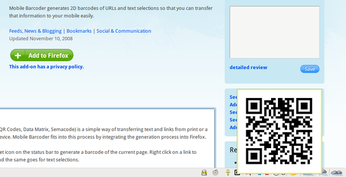Extension Watch: Turn URLs into QR codes with Mobile Barcoder

Productivity Sauce
The Mobile Barcoder extension for Firefox is a one-trick pony, but the trick it does is a really neat one. When browsing the Web, you've probably noticed that some Web sites contain QR codes. These codes offer a convenient way to capture and transfer useful information like URLs and email addresses to your mobile device, provided it can read and process QR codes. Say you found an interesting article while browsing the Web on your laptop and you want to read it later on your mobile device. Snap the QR code containing the article's URL with your device, and you can open the link in the built-in browser. But here is the problem: only a handful of Web sites out there actually use QR codes. This is where Mobile Barcoder comes into the picture. This Firefox extension generates a QR code for the currently opened Web page. Once installed, Mobile Barcoder adds an icon in the right corner of the status bar. Hover the mouse over the icon, and it pops up a QR code containing the URL of the currently viewed Web page. Simple? Yes. Useful? You bet!
Comments
comments powered by DisqusSubscribe to our Linux Newsletters
Find Linux and Open Source Jobs
Subscribe to our ADMIN Newsletters
Support Our Work
Linux Magazine content is made possible with support from readers like you. Please consider contributing when you’ve found an article to be beneficial.

News
-
Photoshop on Linux?
A developer has patched Wine so that it'll run specific versions of Photoshop that depend on Adobe Creative Cloud.
-
Linux Mint 22.3 Now Available with New Tools
Linux Mint 22.3 has been released with a pair of new tools for system admins and some pretty cool new features.
-
New Linux Malware Targets Cloud-Based Linux Installations
VoidLink, a new Linux malware, should be of real concern because of its stealth and customization.
-
Say Goodbye to Middle-Mouse Paste
Both Gnome and Firefox have proposed getting rid of a long-time favorite Linux feature.
-
Manjaro 26.0 Primary Desktop Environments Default to Wayland
If you want to stick with X.Org, you'll be limited to the desktop environments you can choose.
-
Mozilla Plans to AI-ify Firefox
With a new CEO in control, Mozilla is doubling down on a strategy of trust, all the while leaning into AI.
-
Gnome Says No to AI-Generated Extensions
If you're a developer wanting to create a new Gnome extension, you'd best set aside that AI code generator, because the extension team will have none of that.
-
Parrot OS Switches to KDE Plasma Desktop
Yet another distro is making the move to the KDE Plasma desktop.
-
TUXEDO Announces Gemini 17
TUXEDO Computers has released the fourth generation of its Gemini laptop with plenty of updates.
-
Two New Distros Adopt Enlightenment
MX Moksha and AV Linux 25 join ranks with Bodhi Linux and embrace the Enlightenment desktop.


Thanks for the review